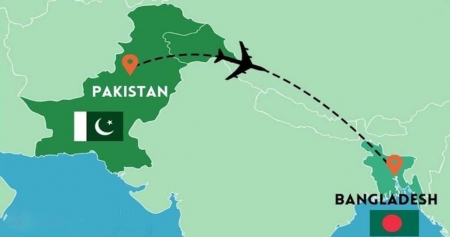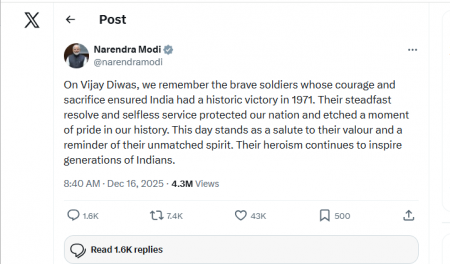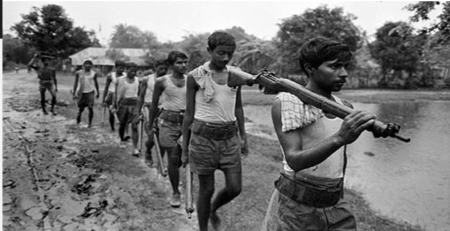Introduction:
A country is considered as developed when it is industrially developed. Industry increases trade and trade increases wealth and well being. Industrial revolution played key role behind the development of present modern era. Like many other countries, South Korea also took the advantage of industrialization adapting industrial
policy as a principal policy of the government and developing industrial sector. South Korean experience in the journey of the development is relevant for the countries like Bangladesh who want to develop themselves from the developing status.
We know that Korea got independence in 1945. Korea had no own government from 1945 to 1947. But after the independence there were very crucial conflict between the communism and the capitalism. Korea was divided into two parts, when Japanese surrendered to Russia in North Korea and to USA in South Korea. In 1947, South Korea got presidential election and the Korean government was formed. But Korean War broke out in 1950. Due to the war, everything was very unstable in three years till the war ended in 1953. The Korean economy was fully relied on foreign aid. Comparing to the South Korea, North Korea was more industrialized. South Korea was prioritized for agriculture and food production during the Japanese era. So, after the war number one priority of Korean government was to provide foods to the people. But Korea has become a miracle of last century applying different types of industrial policy in different regimes. Now Korea is one of the largest economies of the world. I would like to describe all the major policies taken by Korean government in different time in the below.
Import substitution policy:
Korean government introduced import substitution policy after the formation of government for the first time. After the Korean War, the Korean government needed to stabilize the hyper-inflation from the mid-1950. Import substitution polices were employed to achieve industrialization and growth in this period. So it helped infant industries to grow up and to achieve sustainability.
First three year development plan:
In 1960, Korea got civilian revolution, where professors, students and common people participated. As a result the government resigned and Korea got second republic in 1960. This republic changed governing system from presidential system to cabinet system. But second republic lasted only one year. They did not have the experience to govern the people. But this government introduced three years development plan for the first time in the economic development of Korean history.
First five year development plan:
In May 1961, there was a military coup lead by General Park Chung-hee. So, the second republic
was ended by a military coup. He took the power
and got the three year economic development plan to work forward. This government introduced first five year development plan in connection to three year development plan initiated by the second republic.
Labor intensive industries:
As Korea was one of the poorest countries of the world it has no competitive industries. But it has some comparative advantages in labor intensive industries. So, Korea focused on this labor intensiveness. They started to protect infant industries by imposing high tariffs on imported products.
Export oriented policy:
The government adapted export oriented policy through the protective import policy and promoting the policy of labor intensive industries in the half of 1960s. The government tries to gain economic growth by helping Korean companies making export of the products. So that was the industrial policy adapted by the Korean government. That means export policy was the industrial policy in the second part of 1960s.
In this export policy the Korean government took some measures to foster economic growth. The government encouraged exports, discouraged imports and protected domestic industries. The government adapted import substitution industrialization to reduce foreign dependency. The government also took some strategies to make use of nation's comparative advantages in labor intensive manufacturing industries. They reduced income tax on export earnings by 50 percent. Exporters were given the opportunities not to pay business tax and tariffs on imported intermediate goods and capital equipment. Exporters were provided loans at the lower interest rate. Moreover, the government devaluated its currency to maintain the Korean currency at the free trade level.
Heavy and chemical industries:
The Korean industrial policy can be replaced by heavy and chemical industry policy in 1970s. With export promotion policy and import substitution policy Korea improved its structure towards skill and capital intensive products. At that time Korean product faced protectionism in the market of developed countries in the area of labor intensive products. For this reason Korean government promoted heavy and chemical industries such as steel, electronics and ship building. As a result, preferential tax and credit system was increased for HCI instead of incentives to exports. From 1973, the export incentives in the HCI sector began to change step by step. The preferential tax for export was abolished in 1973. In 1974, installment in payment system was introduced instead of tariff exemption on the import of capital equipment. In 1975, tariff rebate system was introduces by abolishing tariff exemption on a raw material for export production. But HCI policy was not successful.
Entering in the liberalizing economy:
In 1988, Seoul hosted Olympic Games. At that time a huge pressure came from the international community to liberalize the Korean economy. Although Korea achieved very high economic development but it did not open the market. There were also some other political reasons. At that time power was seized by a military coup in Korea. International community wanted to legitimate the regime if government liberalized the market. So, political and economic consideration was mixed up. The then government decided to open up the market and liberalize the Korean economy. Actually Seoul Olympic Games brought big changes in Korean economy.
The Korean government participated in Uruguay round negotiations. The Uruguay round decided the main diversions of the global trade circumstances. The liberalization was one of the global trends in the time of 1990s. So, Korea also joined this kind of global trends that influenced Korean industrial policy.
Financial crisis and introducing IT industrial policy:
By the way, Korea faced financial crisis in 1997 and Korean economy was hit. With the special package from IMF Korea could overcome it. Samsung electronics started to produce RAM, memory chips etc. and Korean economy went high again. Korean IT industries accounted to take higher portion of the Korean economy. So trade liberalization and IT industries are the most important characteristics of Korean industrial policy in 1990s. Korea became developed country and according to the regulation of WTO, Korea was no longer regarded as the developing economics. So, Korea lost special privileges they enjoyed before that given to only developing countries.
Privatization and development of IT industries:
Privatization or deregulation policy was introduced to bring dynamism in Korean economy. The government made every effort to deregulate many sectors.
The Korean government gave efforts to attract more foreign direct investment in IT industries. This is one the way for the Korean IT industries to get higher new technologies or they could get more money which was very important to them to achieve the development in their business activities.
In 1990s, IT industries became top industry in Korea. In the middle of the liberalization of the market the Korean government tries to promote specific industries which had competitiveness in the global market. As the IT was one of them, the Korean government concentrated on the promotion of IT industries. As a result of this industrial policy, many companies like Samsung, LG, and SK became mega producer of IT products.
They became active actors in the Korean economy. Because of the developed country status, the Korean government could not provide some industry specific support; they just concentrated on promoting competitiveness and venture business in IT industrial sector.
Korean mobile service is very good quality service in the world. It could be possible because the Korean government deregulated telecommunication service industry that gave a positive impact on it. The government provided various types of physical incentives to IT
industries such as encouraging foreign direct investment in IT industry by providing different tax incentives and financial incentives.
Introducing venture business:
In 1997, the Korean government enacted venture business which opened the sky of cooperative relation between small enterprises and big enterprises. It helped the small company to materialize their creative ideas to produce very good quality products. By developing this kind of cooperative relations between small and medium size enterprises and big enterprises they were able to put the momentum in the economic development. This is one of the reasons why the Korean government enacted the special law for the venture business. In 2000, the Korean government introduces another industrial policy which was similar to the policy of 1997. As a result of introducing venture business, investment in the venture ecosystem of Korea is booming now. Korea placed 5th in the world in the area of homegrown unicorn companies where privately held startup company valued at over $1 billion. At present the Korea has 9 unicorn companies.
Lessons for Bangladesh:
1. Bangladesh needs to patronize innovation and idea based startups. In Korea, those companies who will come up in the market with their own innovative products, they can enjoy tax holyday opportunity for few years. In Bangladesh, Ministry of Industries, Ministry of ICT and Ministry of Textile and Jute may take this kind of initiative to foster innovation in production.
2. Korea followed export oriented policy desperately when they were in the stage of present Bangladesh. They tried to export everything they have; even squirrels also exported from Korea. Our government may follow this policy in order to get benefit from international trade.
3. Bangladesh has comparative advantages in labor intensive industries. We can produce any product at lower price for cheap labor cost which can be one of attractive factors for the foreign direct investment in Bangladesh. To get result from industrialization like Korea, all industries can be relocated to special economic zones.
4. All developed countries are relocating heavy industries to developing countries as they are focusing on technology and merit based industries. Bangladesh government needs to attract foreign direct investment in heavy industries on the basis of joint venture or PPP to catch the advantage of relocation of heavy industries from developed countries.
5. Bangladesh needs to take industrial policy as national policy like South Korea. Because in the present days, industries are only way to achieve development. The government can patronize honest businessmen to create more chaebol in the industrial sector which will ensure more employment in the country.
6. Innovation and doing business is the crucial factors for the development of the industrialization in any country. Unfortunately, the Bangladesh is not in the satisfactory position in both indexes. Bangladesh has ranked 116th innovative countries among 129 countries in the world in 2019. On the other hand, the country rose to a rank of 168th in the global ease of doing business rankings in 2019 from 176th in 2018 out of 190 economies. This progress was possible for three major reforms in the doing business indicator to ease the business process. However, Bangladesh needs to carry more reforms in these sectors and to emphasize the innovation.
Conclusion:
Once Korea was a poor country, but at present Korean economy is one of the largest economies of the world. In 1980, GNI per capita of Korea was only $1870 which increased to $33,720 in2019. How it could be possible? It has been proved that the Korean industrial policy is successful one. We need to learn the factors behind the success and the problem they faced in implementing the policy. Other developing countries like Bangladesh can get lessons from Korean experience. Even though these countries are still developing but depending on their efforts such as implementing appropriate industrial policy they can be largest economy like Korea.
সর্বশেষ এডিট : ০৩ রা জুলাই, ২০২৪ রাত ১০:৫৪


 অনুগ্রহ করে অপেক্ষা করুন। ছবি আটো ইন্সার্ট হবে।
অনুগ্রহ করে অপেক্ষা করুন। ছবি আটো ইন্সার্ট হবে।








